七年级英语作文:关于面子问题
关于面子英语作文
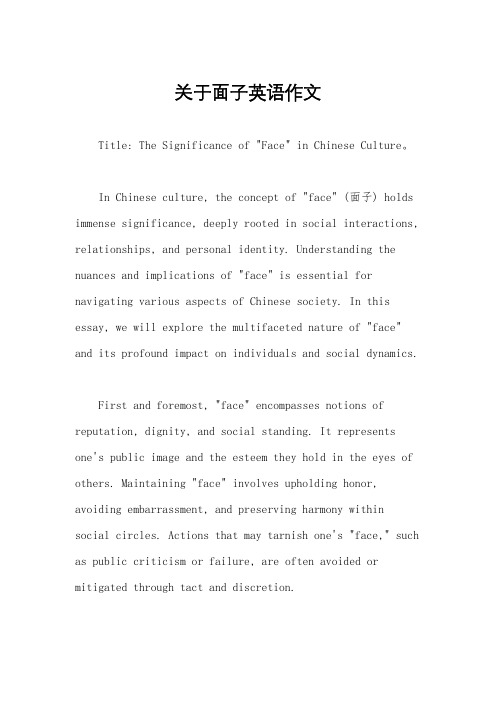
关于面子英语作文Title: The Significance of "Face" in Chinese Culture。
In Chinese culture, the concept of "face" (面子) holds immense significance, deeply rooted in social interactions, relationships, and personal identity. Understanding the nuances and implications of "face" is essential for navigating various aspects of Chinese society. In this essay, we will explore the multifaceted nature of "face" and its profound impact on individuals and social dynamics.First and foremost, "face" encompasses notions of reputation, dignity, and social standing. It representsone's public image and the esteem they hold in the eyes of others. Maintaining "face" involves upholding honor, avoiding embarrassment, and preserving harmony withinsocial circles. Actions that may tarnish one's "face," such as public criticism or failure, are often avoided or mitigated through tact and discretion.Furthermore, "face" extends beyond individual identityto encompass familial and societal relationships. Family "face" reflects the collective reputation and honor ofone's relatives, making it imperative to act in ways that uphold family honor. For example, fulfilling societal expectations, achieving success, and displaying filialpiety are all means of bolstering family "face" and maintaining social harmony.In interpersonal relationships, the concept of "giving face" (給面子) is prevalent, emphasizing respect, courtesy, and deference to others. Giving someone "face" involves acknowledging their status, accomplishments, orcontributions in a manner that affirms their dignity and prestige. Conversely, "losing face" (丢脸) occurs when one experiences public humiliation, shame, or loss of esteem, often resulting in social repercussions and damaged relationships.The importance of "face" is evident in various social contexts, including business negotiations, governmental interactions, and everyday encounters. In business dealings,preserving "face" is crucial for fostering trust, building partnerships, and securing favorable outcomes. Similarly, within bureaucratic structures, maintaining "face" can facilitate cooperation, consensus-building, and bureaucratic efficiency.Moreover, "face" influences communication styles, conflict resolution strategies, and decision-making processes. Indirect communication, saving face, and preserving harmony are prioritized, often leading to nuanced interactions and implicit understandings. Conflicts are often addressed discreetly, with an emphasis on mediation, compromise, and reconciliation to avoid public embarrassment and preserve relationships.In Chinese culture, expressions of humility, modesty, and self-restraint are valued traits associated with "saving face" (保面子). By downplaying achievements, avoiding confrontation, and showing deference to others, individuals can demonstrate humility and preserve social harmony. Conversely, boastfulness, arrogance, and disrespect are frowned upon, as they can lead to loss of"face" and social ostracism.However, the pursuit of "face" is not without its pitfalls. Excessive concern for "face" can lead to superficiality, hypocrisy, and an obsession with appearances. Individuals may prioritize maintaining outward appearances over addressing underlying issues or pursuing genuine personal growth. Moreover, the fear of losing "face" can inhibit risk-taking, innovation, and constructive criticism, stifling creativity and progress.In conclusion, the concept of "face" occupies a central role in Chinese culture, shaping social interactions, relationships, and personal identity. Understanding the nuances of "face" is essential for navigating the complexities of Chinese society and fostering harmonious interpersonal dynamics. By recognizing the significance of "face" and adopting respectful, tactful behavior, individuals can cultivate meaningful relationships, promote social cohesion, and navigate diverse cultural contexts effectively.。
初中英语作文:关于面子问题Face

【导语】学习英语,阅读真的很重要,多阅读一些短篇英语文章也是提高英语阅读能力的一种。
下面是整理发布的“初中英语作文:关于面子问题Face”,欢迎阅读参考!更多相关讯息请关注!【篇一】关于面子问题 FaceToday, our teacher told us a story on the newspaper. She told us that there was a famous university student whose family is very poor and faraway, but he studied very hard and then went to the big city for study. One day, his mother brought some homemade food to him. But he thought his mother will let him lose face, so he pretended he didn't know his mother. I felt ashamed for him and felt ridiculous about the face problem. It’s meaningless. People should lay down their face, live the way they are, don’t live in others’ eyes. Just be yourself, you will be happier. 今天,我们老师给我们讲了一个报纸上的故事。
她告诉我们,有一个大学的学生的家庭很穷,也很偏远,但他学习很努力,之后他就去了大城市学习。
有一天,他的母亲给他带来一些自己家做的食物。
他却认为他的母亲会让他丢脸,所以他假装不认识他的母亲。
我为他感到很羞愧,也觉得这面子问题真的很可笑。
关于面子问题 About Face
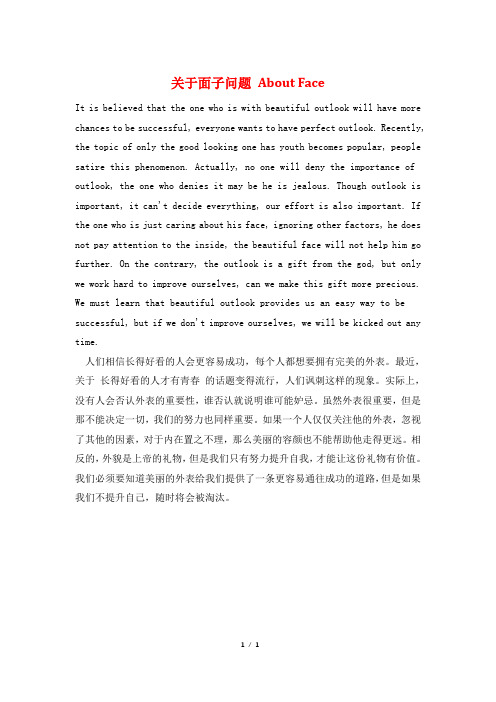
关于面子问题About FaceIt is believed that the one who is with beautiful outlook will have more chances to be successful, everyone wants to have perfect outlook. Recently, the topic of only the good looking one has youth becomes popular, people satire this phenomenon. Actually, no one will deny the importance of outlook, the one who denies it may be he is jealous. Though outlook is important, it can't decide everything, our effort is also important. If the one who is just caring about his face, ignoring other factors, he does not pay attention to the inside, the beautiful face will not help him go further. On the contrary, the outlook is a gift from the god, but only we work hard to improve ourselves, can we make this gift more precious. We must learn that beautiful outlook provides us an easy way to be successful, but if we don't improve ourselves, we will be kicked out any time.人们相信长得好看的人会更容易成功,每个人都想要拥有完美的外表。
面子拿的起放的下作文
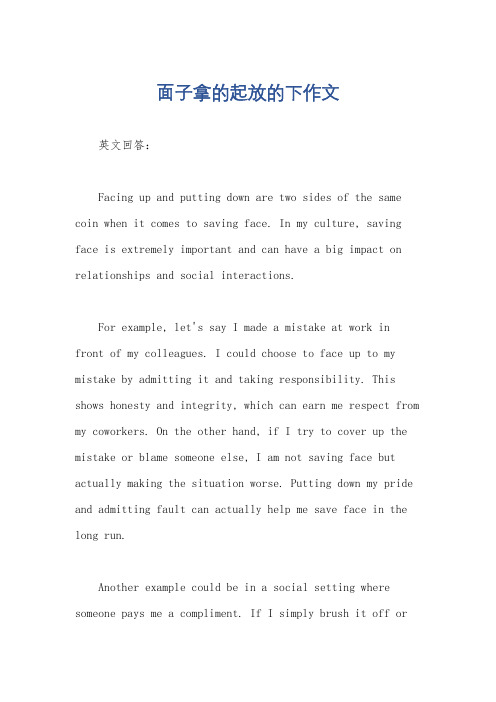
面子拿的起放的下作文英文回答:Facing up and putting down are two sides of the same coin when it comes to saving face. In my culture, saving face is extremely important and can have a big impact on relationships and social interactions.For example, let's say I made a mistake at work infront of my colleagues. I could choose to face up to my mistake by admitting it and taking responsibility. This shows honesty and integrity, which can earn me respect from my coworkers. On the other hand, if I try to cover up the mistake or blame someone else, I am not saving face but actually making the situation worse. Putting down my pride and admitting fault can actually help me save face in the long run.Another example could be in a social setting where someone pays me a compliment. If I simply brush it off ordownplay it, I am not saving face but actually rejectingthe other person's kindness. By accepting the compliment graciously and showing gratitude, I am able to save faceand maintain a positive interaction.中文回答:在面对问题时,我们常常需要拿得起,也要放得下。
我们要有面子英文作文
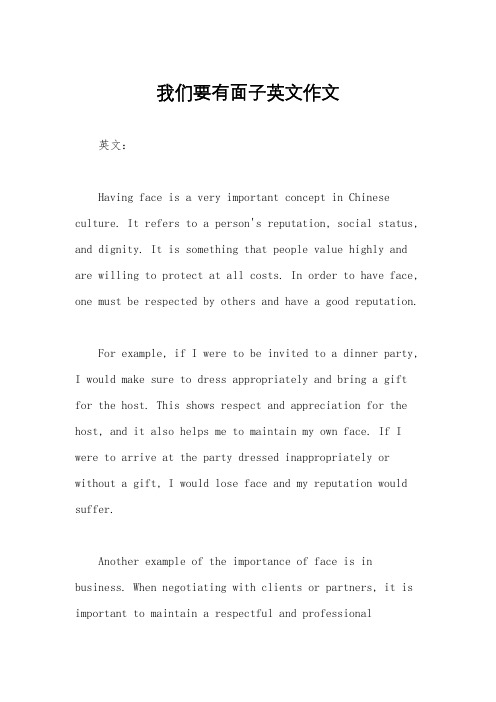
我们要有面子英文作文英文:Having face is a very important concept in Chinese culture. It refers to a person's reputation, social status, and dignity. It is something that people value highly and are willing to protect at all costs. In order to have face, one must be respected by others and have a good reputation.For example, if I were to be invited to a dinner party, I would make sure to dress appropriately and bring a gift for the host. This shows respect and appreciation for the host, and it also helps me to maintain my own face. If I were to arrive at the party dressed inappropriately or without a gift, I would lose face and my reputation would suffer.Another example of the importance of face is in business. When negotiating with clients or partners, it is important to maintain a respectful and professionaldemeanor. This helps to establish trust and credibility, which is essential for successful business relationships. If I were to act unprofessionally or disrespectfully, I would lose face and my reputation in the business world would suffer.中文:在中国文化中,有面子是一个非常重要的概念。
关于面子的英语作文 About Face
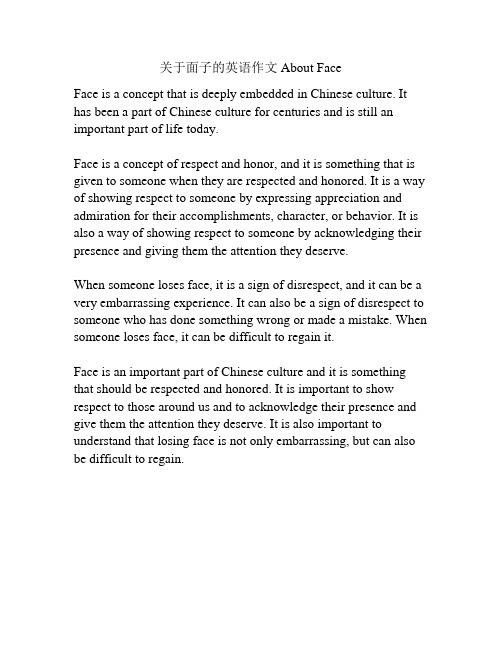
关于面子的英语作文 About FaceFace is a concept that is deeply embedded in Chinese culture. It has been a part of Chinese culture for centuries and is still an important part of life today.Face is a concept of respect and honor, and it is something that is given to someone when they are respected and honored. It is a way of showing respect to someone by expressing appreciation and admiration for their accomplishments, character, or behavior. It is also a way of showing respect to someone by acknowledging their presence and giving them the attention they deserve.When someone loses face, it is a sign of disrespect, and it can be a very embarrassing experience. It can also be a sign of disrespect to someone who has done something wrong or made a mistake. When someone loses face, it can be difficult to regain it.Face is an important part of Chinese culture and it is something that should be respected and honored. It is important to show respect to those around us and to acknowledge their presence and give them the attention they deserve. It is also important to understand that losing face is not only embarrassing, but can also be difficult to regain.。
关于面子的英语作文

关于面子的英语作文1. Face is something we all care about, whether we admit it or not. It's that feeling of pride or shame that comes from how others perceive us.2. We spend so much time trying to maintain our face, putting on a show for the world to see. But deep down, we all know that it's just a facade, a mask we wear to fit in.3. Sometimes, we do things just to save face, even ifit goes against our true feelings or beliefs. It's likewe're living in a constant state of performance, nevertruly being ourselves.4. Face can be fragile, easily shattered by a careless word or a wrong move. And once it's gone, it's hard to rebuild, leaving us feeling exposed and vulnerable.5. But maybe, just maybe, if we let go of our obsession with face, we can finally be free. Free to be authentic, tobe vulnerable, to be truly ourselves without fear of judgment or rejection.6. So let's not be slaves to face, let's break freefrom the chains of society's expectations and embrace our true selves. Because in the end, it's not about saving face, it's about saving our souls.。
关于面子问题的英语作文
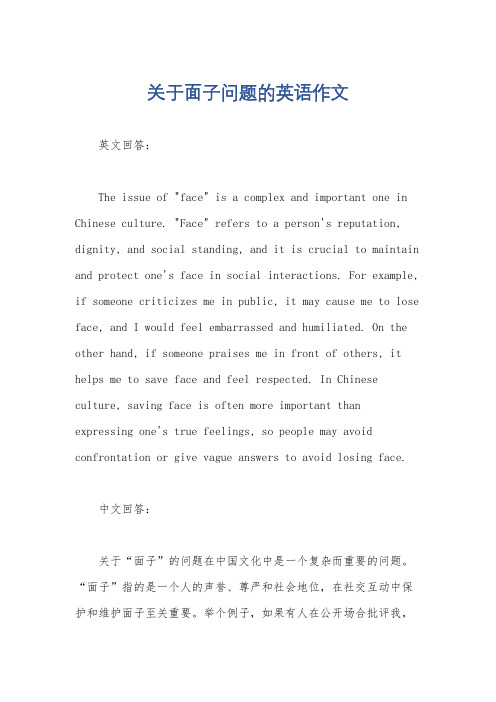
关于面子问题的英语作文英文回答:The issue of "face" is a complex and important one in Chinese culture. "Face" refers to a person's reputation, dignity, and social standing, and it is crucial to maintain and protect one's face in social interactions. For example, if someone criticizes me in public, it may cause me to lose face, and I would feel embarrassed and humiliated. On the other hand, if someone praises me in front of others, it helps me to save face and feel respected. In Chinese culture, saving face is often more important than expressing one's true feelings, so people may avoid confrontation or give vague answers to avoid losing face.中文回答:关于“面子”的问题在中国文化中是一个复杂而重要的问题。
“面子”指的是一个人的声誉、尊严和社会地位,在社交互动中保护和维护面子至关重要。
举个例子,如果有人在公开场合批评我,那么我就会丢面子,感到尴尬和羞辱。
另一方面,如果有人在别人面前称赞我,那就能帮我保全面子,感到受到尊重。
在中国文化中,保全面子通常比表达真实感受更重要,因此人们可能会避免冲突或含糊其辞,以免丢面子。
面子拿的起放的下英语作文

面子拿的起放的下英语作文英文回答:Being Able to Give and Take Face.In many cultures, the concept of "face" is highly valued. Face refers to one's social status, reputation, and self-respect. Losing face can be a devastating blow, while saving face is paramount. However, to truly maintain one's face, it is essential to be able to both give and take face.Giving Face.Giving face to someone means acknowledging their worth and treating them with respect. It can be done through a variety of actions, such as:Complimenting them.Offering them help.Listening to them attentively.Showing them deference.By giving face to others, we make them feel valued and appreciated. This builds goodwill and strengthens relationships.Taking Face.Taking face, on the other hand, means accepting compliments and offers of help without feeling superior. It involves being humble and gracious, even when we are being praised or honored. By taking face, we demonstrate that we are not arrogant or self-important.It is important to note that taking face does not mean being submissive or allowing others to take advantage of us. Rather, it means acknowledging that we are all equal andthat we should treat each other with respect.Balancing Giving and Taking Face.The ability to both give and take face is a delicate balancing act. Too much face-giving can make us appear weak or subservient, while too much face-taking can make us appear arrogant or entitled. The key is to find a happy medium, where we can acknowledge the worth of others without sacrificing our own.中文回答:能拿得起放得下面子。
高中英语作文:关于面子问题AboutFace

【导语】英语美⽂的阅读有助于我们对英语知识的学习,提升我们的英语能⼒,以下“⾼中英语作⽂:关于⾯⼦问题About Face”由⽆忧考整理发布,欢迎阅读参考!更多相关讯息请关注⽆忧考! 【篇⼀】关于⾯⼦问题About FaceThere is an old saying in China“people need face while the trees need skin”,the meaning is that Chinese people pay special attention on the dignity. Loving face is most people’s behavior, so they like to brag, they enjoy being adored by others. About the face problem, I think we should not take it serious, we are not living for other people, we are living for ourselves. The real self-esteem is from our hearts, not from other people. Chinese people like to brag, they brag about their property, hoping that people will respect him. The funny thing is that only the fake successful people will brag, the real one is silent, they keep working hard, the successful career supports their self-esteem. If we want people to respect us, we should show our reality, be nice to them, never brag about ourselves.在中国有句⽼话“⼈要脸树要⽪”,意思是中国⼈很注重尊严问题。
关于面子问题的英语作文
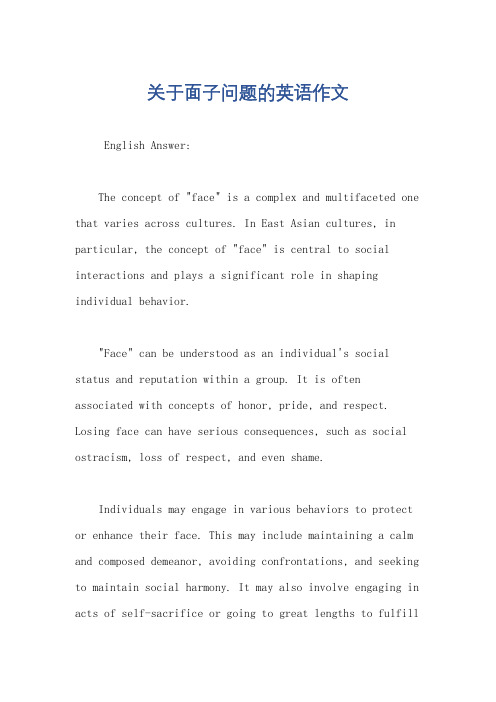
关于面子问题的英语作文English Answer:The concept of "face" is a complex and multifaceted one that varies across cultures. In East Asian cultures, in particular, the concept of "face" is central to social interactions and plays a significant role in shaping individual behavior."Face" can be understood as an individual's social status and reputation within a group. It is often associated with concepts of honor, pride, and respect. Losing face can have serious consequences, such as social ostracism, loss of respect, and even shame.Individuals may engage in various behaviors to protect or enhance their face. This may include maintaining a calm and composed demeanor, avoiding confrontations, and seeking to maintain social harmony. It may also involve engaging in acts of self-sacrifice or going to great lengths to fulfillsocial obligations.The concept of "face" can be seen as a social currency that individuals use to navigate social interactions and maintain their position within a group. However, it is important to note that the concept of "face" is not static and can change over time and across different social contexts.中文回答:什么是面子?面子是一个复杂且多方面的概念,在不同文化中有着不同的含义。
面子英语作文

The Complexities of Face in Chinese Culture In the intricate tapestry of Chinese culture, the concept of "face" stands out as a unique and multifaceted element, deeply ingrained in the social and psychological fabrics of the society. The term "face" in Chinese, knownas "mianzi," encompasses a range of meanings that extend beyond the literal interpretation of one's physical appearance. It is a complex construct, intertwined with personal dignity, social status, and the expectation of recognition and respect from others.The significance of face in Chinese society cannot be overstated. It is a powerful motivator that shapesindividual behaviors and social interactions. The desire to maintain or enhance one's face often guides decision-making, influencing even the smallest of daily interactions. In Chinese business settings, the concept of face isparticularly salient, as it plays a crucial role in negotiations, networking, and the establishment of trust.One of the most notable aspects of face in Chinese culture is its collective nature. Unlike theindividualistic understanding of dignity and self-worth inWestern cultures, Chinese face is often viewed as areflection of one's family, community, or even the nation. As such, losing face can have far-reaching consequences,not only affecting the individual but also potentially tarnishing the reputation of their larger social group.The pursuit of face also manifests in the Chinese language itself. Euphemisms and circumlocutions are commonly used to avoid direct confrontation or embarrassment, thus preserving the face of all parties involved. This linguistic nuance is a testament to the importance of maintaining harmony and avoiding conflict, which are often viewed as essential to preserving one's face.However, the obsession with face can also have its downsides. The pressure to maintain a positive facade can lead to the suppression of genuine feelings and opinions, stifling honest communication and authentic self-expression. Additionally, the fear of losing face can sometimes discourage individuals from taking risks or pursuing their passions, out of concern for how others might perceivetheir actions.In conclusion, the concept of face in Chinese cultureis a complex and multifaceted phenomenon, deeplyintertwined with social norms, personal dignity, and the desire for recognition and respect. While it can be a powerful force for positive social interaction and harmony, it can also have its limiting effects, constraining individual expression and innovation. Understanding the nuances of face in Chinese culture is essential for anyone wishing to navigate the intricate social landscape of this ancient and vibrant civilization.**中国文化中的面子复杂性**在中国文化的纷繁复杂中,“面子”这一概念以其独特且多面性的特质脱颖而出,深深植根于社会的社会结构和心理结构之中。
关于面子的英文作文
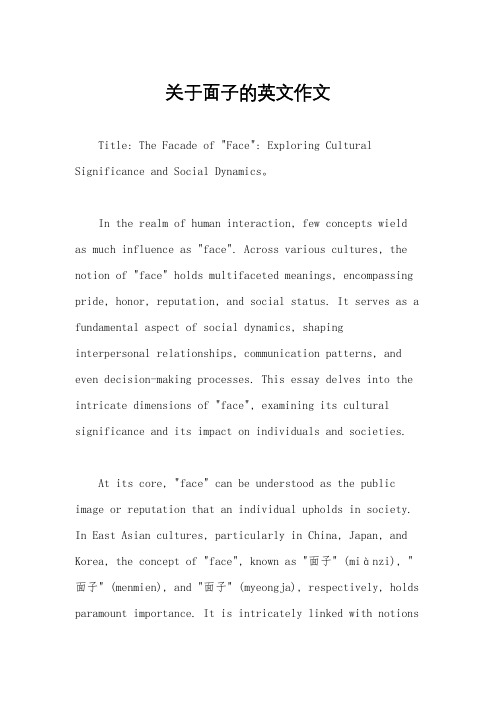
关于面子的英文作文Title: The Facade of "Face": Exploring Cultural Significance and Social Dynamics。
In the realm of human interaction, few concepts wield as much influence as "face". Across various cultures, the notion of "face" holds multifaceted meanings, encompassing pride, honor, reputation, and social status. It serves as a fundamental aspect of social dynamics, shapinginterpersonal relationships, communication patterns, and even decision-making processes. This essay delves into the intricate dimensions of "face", examining its cultural significance and its impact on individuals and societies.At its core, "face" can be understood as the public image or reputation that an individual upholds in society. In East Asian cultures, particularly in China, Japan, and Korea, the concept of "face", known as "面子" (miànzi), "面子" (menmien), and "面子" (myeongja), respectively, holds paramount importance. It is intricately linked with notionsof dignity, respect, and social harmony. Losing face, or "丢脸" (diūliǎn) in Chinese, "顔を潰す" (kao o tsubusu) in Japanese, and "얼굴을잃다" (eolgureul ilhda) in Korean, is often perceived as a deeply shameful experience, capable of damaging one's reputation and social standing.The maintenance of face is not merely an individual concern but a collective endeavor deeply embedded within cultural norms and societal expectations. Social interactions are carefully choreographed to preserve the face of all parties involved, often leading to indirect communication styles, avoidance of confrontation, and an emphasis on politeness and diplomacy. For instance, in Chinese culture, the concept of "saving face" ("给面子"gěi miànzi) involves preserving one's own dignity as well as that of others, even at the expense of honesty or transparency.However, the significance of face extends beyond East Asia and permeates various cultural contexts. In the Middleلجو" (izzat wa wajh) East, for example, the concept of "زعin Arabic-speaking countries encompasses similar notions ofhonor, pride, and social standing. Similarly, in Latin America, the concept of "cara" in Spanish-speaking countries embodies the idea of maintaining one's public image and reputation.In Western societies, while the concept of face may not be as explicitly articulated, elements of it still exist in the form of reputation, prestige, and social capital. The desire to uphold one's image in the eyes of others influences behavior in professional, social, and even digital realms. Social media platforms serve as modern arenas where individuals curate and project their idealized selves, often striving to present a flawless facade to the world.Despite its pervasive influence, the pursuit of face is not without its complexities and contradictions. While it fosters social cohesion and harmony, it can also give rise to superficiality, hypocrisy, and the suppression of individual authenticity. The pressure to conform tosocietal expectations and maintain a perfect image can exact a toll on mental health, leading to feelings ofinadequacy, anxiety, and depression.Moreover, the relentless quest for face can impede genuine communication and interpersonal relationships. Fear of embarrassment or loss of face may deter individuals from expressing their true thoughts and emotions, resulting in surface-level interactions devoid of depth and sincerity. In professional settings, the reluctance to address conflicts or provide constructive feedback for fear of causing offense can hinder innovation and growth within organizations.Furthermore, the commodification of face in consumerist societies exacerbates social inequality and reinforces hierarchies based on wealth, status, and appearance. The relentless pursuit of material possessions and external validation perpetuates a cycle of consumption and comparison, wherein individuals measure their self-worth by superficial standards rather than intrinsic values.In light of these complexities, achieving a balanced perspective on face necessitates a nuanced understanding ofcultural nuances, individual autonomy, and collective well-being. While the preservation of dignity and respect is crucial for social harmony, it should not come at the expense of authenticity, empathy, and genuine human connection.In conclusion, the concept of "face" embodies a rich tapestry of cultural meanings, social dynamics, and psychological implications. It serves as a lens through which to examine the complexities of human interaction, identity, and society. By critically examining the role of face in shaping our lives, we can cultivate greater empathy, understanding, and mutual respect in an increasingly interconnected world.。
不要让面子左右你作文

不要让面子左右你作文英文回答:Don't Let Face Dictate Your Actions.In our society, face plays a significant role inshaping our behavior and decisions. Face, or "mianzi" in Chinese, refers to the social status, reputation, anddignity that individuals strive to maintain in front of others. While it is important to maintain a positive image, it is equally essential not to let face dictate our actions. In this essay, I will discuss the reasons why we should not let face control us and provide examples to support my argument.Firstly, allowing face to influence our decisions can lead to dishonesty and insincerity. When we prioritize saving face over being honest, we may resort to lying or hiding the truth. For instance, if someone asks for our opinion on a project, but we know it is poorly executed, wemight feel compelled to give a positive review to avoid hurting their feelings and maintain their respect. However, this not only compromises our integrity but also prevents the person from receiving constructive feedback that could help them improve.Secondly, the fear of losing face can hinder personal growth and development. People may avoid taking risks or trying new things because they are afraid of failure and the potential embarrassment it may bring. For example, someone may decline a job opportunity or refuse to participate in a public speaking event because they worry about making mistakes and being judged by others. By succumbing to these fears, individuals miss out on valuable learning experiences and limit their potential for growth.Furthermore, allowing face to control our actions can lead to conformity and hinder creativity. When weprioritize fitting in and maintaining social harmony, we may suppress our unique ideas and perspectives. For instance, in group discussions or brainstorming sessions, individuals may hesitate to express unconventional opinionsor suggestions to avoid being seen as different or disruptive. This conformity limits innovation and stifles creativity, as groundbreaking ideas often arise from challenging the status quo and thinking outside the box.In conclusion, while face plays a significant role in our society, it is important not to let it dictate our actions. Allowing face to control us can lead to dishonesty, hinder personal growth, and stifle creativity. Instead, we should prioritize honesty, embrace challenges, and encourage diverse perspectives. By doing so, we can fostera more authentic and innovative society.中文回答:不要让面子左右你的行为。
要面子还是不要面子作文
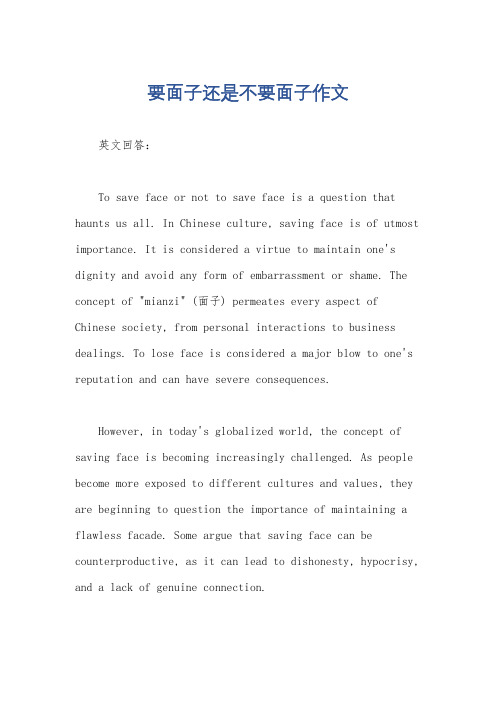
要面子还是不要面子作文英文回答:To save face or not to save face is a question that haunts us all. In Chinese culture, saving face is of utmost importance. It is considered a virtue to maintain one's dignity and avoid any form of embarrassment or shame. The concept of "mianzi" (面子) permeates every aspect of Chinese society, from personal interactions to business dealings. To lose face is considered a major blow to one's reputation and can have severe consequences.However, in today's globalized world, the concept of saving face is becoming increasingly challenged. As people become more exposed to different cultures and values, they are beginning to question the importance of maintaining a flawless facade. Some argue that saving face can be counterproductive, as it can lead to dishonesty, hypocrisy, and a lack of genuine connection.Ultimately, the decision of whether or not to save face is a personal one. There is no right or wrong answer, as the best course of action will vary depending on the individual situation. However, it is important to be aware of the consequences of both saving and losing face, and to make an informed decision that is in line with your own values and goals.Here are some factors to consider when deciding whether or not to save face:The potential consequences of losing face. Losing face can have a negative impact on your reputation, relationships, and career. It is important to weigh the potential consequences before deciding whether or not to risk it.Your own values and goals. What is most important to you? Maintaining your reputation or being honest and genuine? Your decision should be aligned with your own values and goals.The context of the situation. Some situations may call for saving face, while others may not. It is important to consider the context of the situation before making a decision.中文回答:面子,顾名思义,就是面子。
正确看待面子作文800字
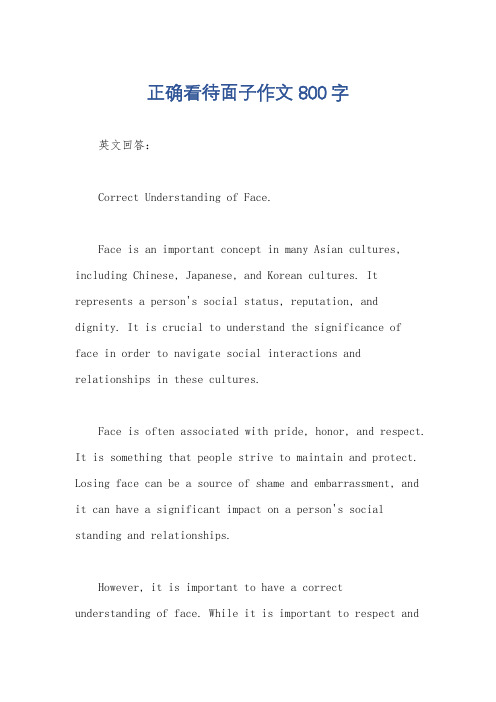
正确看待面子作文800字英文回答:Correct Understanding of Face.Face is an important concept in many Asian cultures, including Chinese, Japanese, and Korean cultures. It represents a person's social status, reputation, and dignity. It is crucial to understand the significance of face in order to navigate social interactions and relationships in these cultures.Face is often associated with pride, honor, and respect. It is something that people strive to maintain and protect. Losing face can be a source of shame and embarrassment, and it can have a significant impact on a person's social standing and relationships.However, it is important to have a correctunderstanding of face. While it is important to respect andhonor others' face, it is equally important to not let face dictate our actions and decisions. Sometimes, people may go to great lengths to save face, even if it means sacrificing their integrity or honesty. This can lead to a lack of authenticity and trust in relationships.Instead, we should strive to have a balanced approach to face. It is important to respect and honor face, but not at the expense of our values and principles. We should be able to admit our mistakes and shortcomings without fear of losing face, and we should also be understanding and forgiving when others make mistakes.In conclusion, face is an important aspect of many Asian cultures, and it is crucial to have a correct understanding of its significance. While it is important to respect and honor face, it should not come at the expense of our integrity and authenticity.中文回答:正确看待面子。
要面子还是不要面子作文
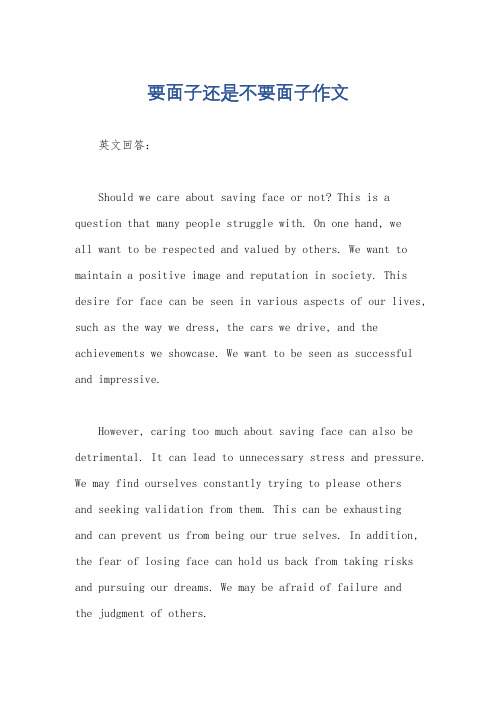
要面子还是不要面子作文英文回答:Should we care about saving face or not? This is a question that many people struggle with. On one hand, weall want to be respected and valued by others. We want to maintain a positive image and reputation in society. This desire for face can be seen in various aspects of our lives, such as the way we dress, the cars we drive, and the achievements we showcase. We want to be seen as successful and impressive.However, caring too much about saving face can also be detrimental. It can lead to unnecessary stress and pressure. We may find ourselves constantly trying to please othersand seeking validation from them. This can be exhaustingand can prevent us from being our true selves. In addition, the fear of losing face can hold us back from taking risks and pursuing our dreams. We may be afraid of failure andthe judgment of others.In my opinion, it is important to strike a balance between saving face and being true to ourselves. It is natural to want to be respected and admired by others, but we should not let it define our worth. We should not be afraid to make mistakes and learn from them. It is through our failures and vulnerabilities that we grow and become stronger individuals.For example, I used to be very conscious about what others thought of me. I would always dress up and put on a show to impress others. However, I realized that this was not sustainable and was not making me happy. I decided to let go of the need to save face and started focusing on my own happiness and personal growth. I started pursuing my passions and taking risks, even if it meant potentially embarrassing myself. And you know what? I became much happier and more fulfilled.中文回答:我们是否应该在意面子呢?这是许多人一直在纠结的问题。
好面子的英文作文
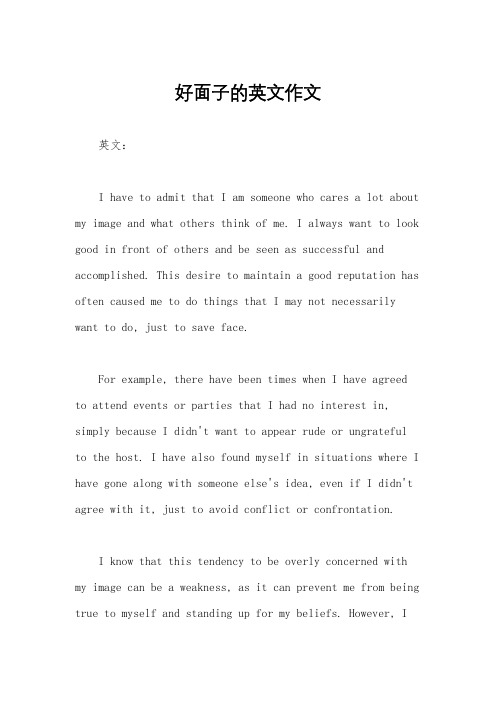
好面子的英文作文英文:I have to admit that I am someone who cares a lot about my image and what others think of me. I always want to look good in front of others and be seen as successful and accomplished. This desire to maintain a good reputation has often caused me to do things that I may not necessarily want to do, just to save face.For example, there have been times when I have agreed to attend events or parties that I had no interest in, simply because I didn't want to appear rude or ungrateful to the host. I have also found myself in situations where I have gone along with someone else's idea, even if I didn't agree with it, just to avoid conflict or confrontation.I know that this tendency to be overly concerned with my image can be a weakness, as it can prevent me from being true to myself and standing up for my beliefs. However, Ialso believe that there is some value in maintaining a good reputation and being seen as someone who is reliable and trustworthy.中文:我必须承认,我是一个非常在意自己形象和别人对我的看法的人。
英文作文lack face to
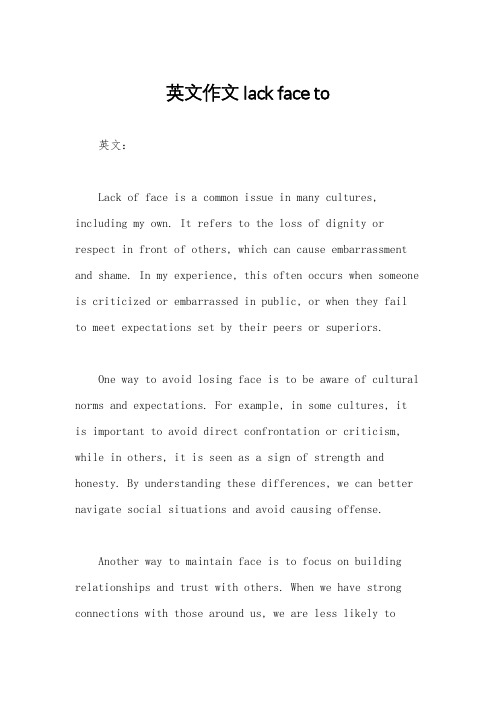
英文作文lack face to英文:Lack of face is a common issue in many cultures, including my own. It refers to the loss of dignity or respect in front of others, which can cause embarrassment and shame. In my experience, this often occurs when someone is criticized or embarrassed in public, or when they fail to meet expectations set by their peers or superiors.One way to avoid losing face is to be aware of cultural norms and expectations. For example, in some cultures, itis important to avoid direct confrontation or criticism, while in others, it is seen as a sign of strength and honesty. By understanding these differences, we can better navigate social situations and avoid causing offense.Another way to maintain face is to focus on building relationships and trust with others. When we have strong connections with those around us, we are less likely tofeel embarrassed or ashamed in their presence. This can be achieved through open communication, active listening, and showing empathy and understanding.In addition, it is important to recognize that everyone makes mistakes and experiences setbacks. Instead of dwelling on our failures, we can focus on learning from them and using them as opportunities for growth and improvement. By taking a positive and proactive approach, we can avoid losing face and instead build our reputation and credibility.中文:在许多文化中,包括我的文化,面子问题是一个普遍存在的问题。
面子工程的英文作文
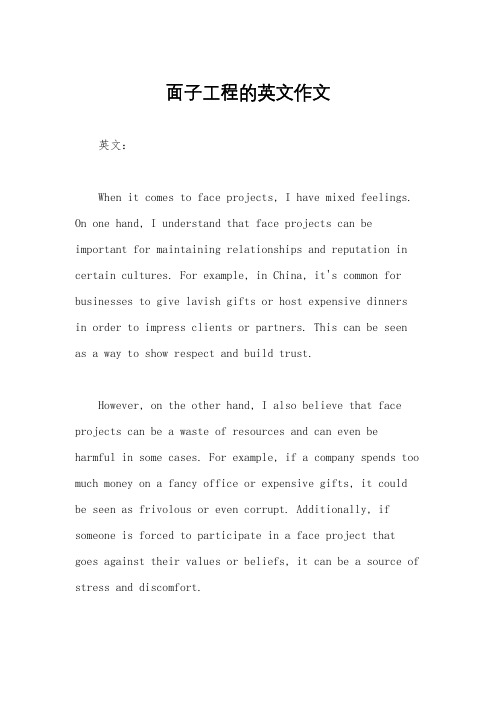
面子工程的英文作文英文:When it comes to face projects, I have mixed feelings. On one hand, I understand that face projects can be important for maintaining relationships and reputation in certain cultures. For example, in China, it's common for businesses to give lavish gifts or host expensive dinnersin order to impress clients or partners. This can be seen as a way to show respect and build trust.However, on the other hand, I also believe that face projects can be a waste of resources and can even be harmful in some cases. For example, if a company spends too much money on a fancy office or expensive gifts, it could be seen as frivolous or even corrupt. Additionally, if someone is forced to participate in a face project that goes against their values or beliefs, it can be a source of stress and discomfort.Overall, I think it's important to strike a balance between face projects and practicality. It's okay to invest in relationships and reputation, but it should be done in a way that is ethical and sustainable.中文:说到面子工程,我有着复杂的感受。
- 1、下载文档前请自行甄别文档内容的完整性,平台不提供额外的编辑、内容补充、找答案等附加服务。
- 2、"仅部分预览"的文档,不可在线预览部分如存在完整性等问题,可反馈申请退款(可完整预览的文档不适用该条件!)。
- 3、如文档侵犯您的权益,请联系客服反馈,我们会尽快为您处理(人工客服工作时间:9:00-18:30)。
七年级英语作文:关于面子问题
★以下是###英文写作翻译频道为大家整理的《七年级英语作文:
关于面子问题》,供大家参考。
更多内容请看本站频道。
Today, our teacher told us a story on the newspaper. She told us that there was a famous university student whose
family is very poor and faraway, but he studied very hard and then went to the big city for study. One day, his mother brought some homemade food to him. But he thought his mother will let him lose face, so he pretended he didn't know his mother. I felt ashamed for him and felt ridiculous about the face problem. It’s meaningless. People should lay down their face, live the way they are, don’t live in others’ eyes.
Just be yourself, you will be happier.
今天,我们老师给我们讲了一个报纸上的故事。
她告诉我们,有
一个大学的学生的家庭很穷,也很偏远,但他学习很努力,之后他就
去了大城市学习。
有一天,他的母亲给他带来一些自己家做的食物。
他却认为他的母亲会让他丢脸,所以他假装不理解他的母亲。
我为他
感到很羞愧,也觉得这面子问题真的很可笑。
毫无意义!人们应该放
下面子,活出自我,不要活在别人的眼里。
做你自己,你会更快乐的。
